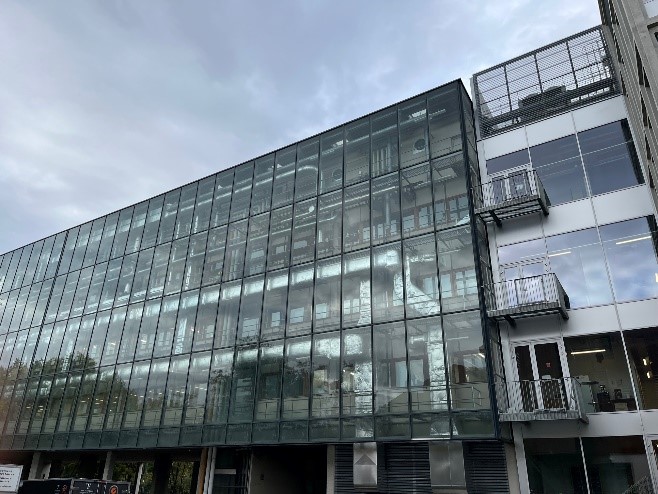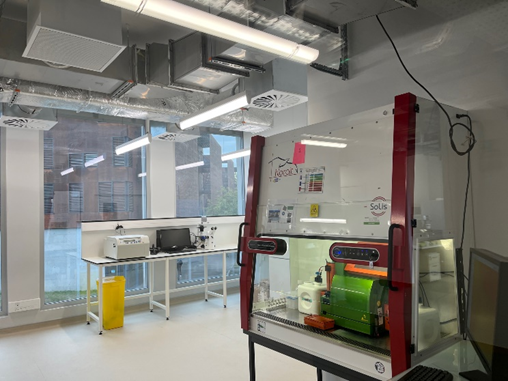New premises for CIRI and SFR Biosciences.
CIRI and SFR Biosciences inaugurated their new premises on avenue Tony Garnier, on the site of Claude Bernard Lyon 1 University, on October 25. Eight CIRI research teams have moved into these new premises, as well as 5 SFR Biosciences technical platforms (Support and Research Unit/Biology Service Unit) and the management and administrative services of the two units. These premises include a brand new flow cytometry platform, already accessible to Biology researchers, and level 3 confined laboratories. Take a guided tour!


Understanding infectious diseases for better control
Eight of the 26 CIRI (Centre International de Recherche en Infectiologie) teams have moved into their new premises, close to the cutting-edge equipment offered by SFR Biosciences and to the teams working at ENS de Lyon and in the Gerland biodistrict. Of particular note are the beautiful photos in the corridors of the SFR Biosciences offices and laboratories, taken by Vincent Moncorgé.
François-Loïc Cosset, Director of the CIRI, and François Vandenesch, deputy director, began by presenting CIRI and the background of the project, while Yann Leverrier, Director of SFR Biosciences, introduced the new platforms. They thanked all the funders, most of whom were represented for the occasion, and all those who had contributed to the project, with a special mention for Denis Gerlier from the CIRI, who acted as a link between all the project's players, right up to the last minutes before the inauguration.
Two CIRI teams then presented their current work to illustrate the diversity of research at the laboratory. Sophie Trouillet-Assant, from the Virpath team, emphasized the importance of collaborative research with the HCL (Hospices civils de Lyon/Civil Hospices of Lyon), particularly during the COVID19 pandemic. This work has demonstrated the improved efficacy of a combination of different vaccines, which has influenced vaccine recommendation policies. A better understanding of immune response through these studies has also provided the basis for an industrial chair aimed at improving the diagnosis of emerging respiratory diseases in the future.
Xavier Charpentier's team is working on antibiotic resistance, a "silent pandemic" that already kills over a million people a year worldwide. The team is studying the mechanisms and dynamics of the emergence of antibiotic resistance in populations of A. baumannii. Other CIRI teams are working at better understanding and anticipating the spread of resistant strains in hospitals, and others on the use of phage therapy as an alternative to antibiotics.
The link between laboratory research, clinical research in hospitals and animal health research was strongly emphasized by the various speakers, who stressed the major role played by the Lyon site in the field of infectious diseases. Here, we do "today's research for tomorrow's health".
A flow cytometry platform
This new laboratory, equipped with state-of-the-art multiparametric instruments, enables researchers to analyze or sort cells of interest with unrivalled speed and precision. Every year, more than 220 academic research teams use the equipments on the SFR Biosciences platforms and draw on the skills of its staff, as well as around twenty research teams from private companies and start-ups.
"This sharing makes it possible to carry out research that no single laboratory could afford on its own. Cytometers can cost €300-€500,000. Our engineers provide their expertise to the scientists, and offer training and services", explains Yann Leverrier, Director of SFR Biosciences. The immuno-phenotyping and genetic and cellular analysis platforms have also taken up residence in the new building.

Experiments in confined environments
On the top two floors of the building, platforms have been created for pathogen experimentation in confined environments, enabling crucial research, for example regarding the impact of different microbiota on health or resistance to infections. These laboratories, equipped with cutting-edge analytical equipment, provide safe environment to study various pathogens. They offer essential tools for tackling today's major health challenges in the field of infectious diseases (study of new treatments, development of vaccines, new models of pathologies, insects as vectors).
Rosalind Franklin, forgotten by the Nobel Prize
Rosalind Franklin is a British physical chemist. In 1947, she joined the CNRS to determine the amorphous structures of carbon using X-ray diffractometry. In 1951, she set up an X-ray diffraction laboratory at King's College London to study the structure of DNA. A pioneer in molecular biology, her work was crucial in the discovery of the helical structure of deoxyribonucleic acid (DNA). The X-ray diffraction images of DNA she obtained in 1952 with her pupil Raymond Gosling made it possible to infer the presence of a double helix in DNA, its pitch and the distance between base pairs. Her competitors Watson and Crick took note of this data and used it to publish their own article in the journal Nature, for which they were awarded the Nobel Prize for Medicine in 1962. Rosalind Franklin's contribution was not recognized neither in the original article nor during the Nobel Prize ceremony. A victim of societal sexism and unfair competition from her peers, the name of this remarkable scientist remained forgotten until the early 2000s. Her discoveries, including the first resolution of an RNA (ribonucleic acid) virus nucleocapsid structure, were essential to the development of biology and infectious diseases in the second half of the 20th century.
Funders
The building was financed up to 15M€ under the State-Region Plan Contract:
- Auvergne Rhône Alpes Region: €6.5M
- Metropolis of Lyon: €5.5M
- Inserm: €2 million
- Claude Bernard Lyon 1 University: €1M
Additional funding for the acquisition of scientific equipment was provided by:
- FEDER-FSE CIRI equipment program (€1.9M) awarded by the Region and supported by Inserm
- FEDER-FSE SFR Biosciences PIExMiCo (Platform for confined environment experimentation) equipment program: €3.1M, awarded by the Region and supported by the ENS de Lyon.
- Equipex Infectio Tron awarded by ANR and supported by Claude Bernard Lyon 1 University





